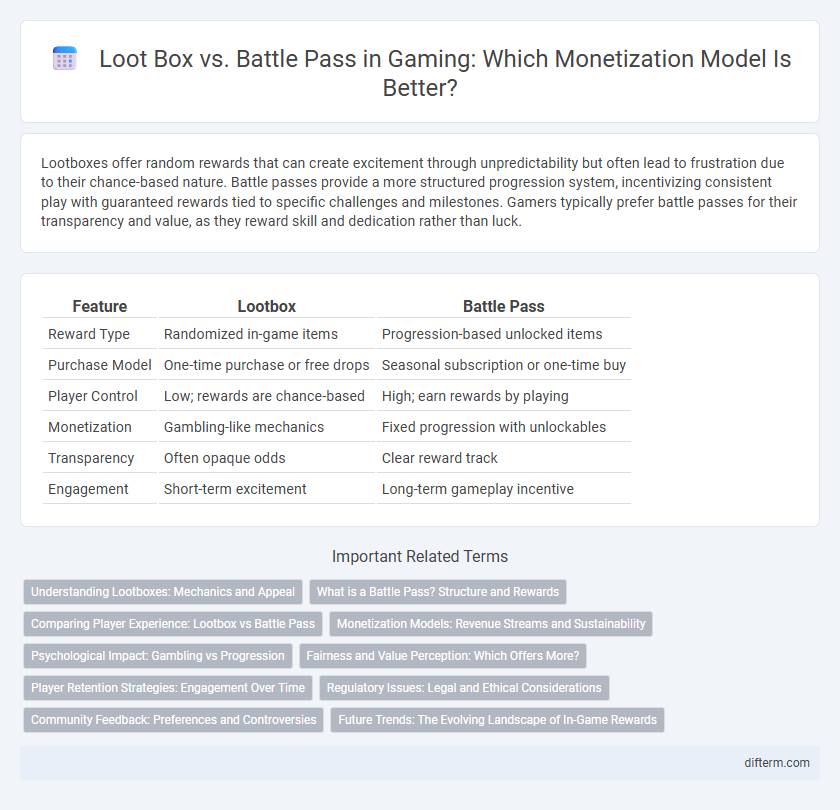Lootboxes offer random rewards that can create excitement through unpredictability but often lead to frustration due to their chance-based nature. Battle passes provide a more structured progression system, incentivizing consistent play with guaranteed rewards tied to specific challenges and milestones. Gamers typically prefer battle passes for their transparency and value, as they reward skill and dedication rather than luck.
Table of Comparison
| Feature | Lootbox | Battle Pass |
|---|---|---|
| Reward Type | Randomized in-game items | Progression-based unlocked items |
| Purchase Model | One-time purchase or free drops | Seasonal subscription or one-time buy |
| Player Control | Low; rewards are chance-based | High; earn rewards by playing |
| Monetization | Gambling-like mechanics | Fixed progression with unlockables |
| Transparency | Often opaque odds | Clear reward track |
| Engagement | Short-term excitement | Long-term gameplay incentive |
Understanding Lootboxes: Mechanics and Appeal
Lootboxes are virtual containers offering randomized in-game items, relying on chance to unlock rare skins, weapons, or characters that enhance gameplay or personalization. Their appeal lies in the thrill of unpredictability and potential high-value rewards, creating an engaging, lottery-like experience for players. However, this randomness often leads to controversial discussions around fairness and monetization ethics within the gaming community.
What is a Battle Pass? Structure and Rewards
A Battle Pass is a progression system in video games where players unlock rewards by earning experience points or completing challenges over a set period. It typically features multiple tiers that offer exclusive cosmetic items, in-game currency, and character upgrades as players level up. Unlike loot boxes, Battle Pass rewards are transparent and earned through gameplay rather than random chance.
Comparing Player Experience: Lootbox vs Battle Pass
Lootboxes offer a randomized reward system that can create excitement through chance but may lead to player frustration due to lack of guaranteed progression. Battle passes provide a structured, tiered reward system that ensures consistent value and motivates ongoing engagement with clear objectives. This comparison highlights how battle passes often enhance player satisfaction by combining transparency and steady reward pacing, unlike the unpredictable nature of lootboxes.
Monetization Models: Revenue Streams and Sustainability
Lootboxes generate revenue through randomized rewards, encouraging repeated purchases with a gamble-like allure but often face criticism for potential ethical issues and regulatory scrutiny. Battle passes offer a structured, tiered progression system where players pay upfront or seasonally, ensuring predictable income and longer player engagement through exclusive, time-limited content. This sustainability model favors ongoing content creation and player retention, making battle passes a more stable and transparent monetization approach in the gaming industry.
Psychological Impact: Gambling vs Progression
Lootboxes trigger psychological responses similar to gambling by exploiting variable-ratio reinforcement schedules, leading to unpredictable rewards that encourage repeated purchases. Battle passes leverage progression-based motivation, offering transparent goals and guaranteed rewards that foster sustained engagement without the risk of compulsive spending. Understanding these distinct psychological impacts helps developers design monetization strategies that balance player satisfaction and ethical considerations.
Fairness and Value Perception: Which Offers More?
Lootboxes often generate controversy due to their randomized reward system, raising concerns about fairness and perceived value among players who may spend money without guaranteed returns. Battle passes provide a more transparent progression model, allowing gamers to unlock specific rewards through consistent gameplay, enhancing the sense of fairness and value. Studies indicate that players generally perceive battle passes as offering better value, as they reward effort rather than chance.
Player Retention Strategies: Engagement Over Time
Lootboxes rely on randomized rewards to drive short-term excitement but often lead to player fatigue and declining retention due to perceived pay-to-win mechanics. Battle passes offer structured progression and predictable unlockables that encourage consistent play, fostering long-term engagement by rewarding skill and dedication. Game developers prioritize battle passes for sustainable player retention through clear goals and continuous content updates.
Regulatory Issues: Legal and Ethical Considerations
Loot boxes face stringent regulatory scrutiny due to their resemblance to gambling, with several countries implementing age restrictions or outright bans to protect minors from potential addiction and financial harm. Battle passes typically avoid these legal pitfalls by offering transparent content progression without randomized rewards, aligning better with consumer protection laws. Ethical debates center on fairness and exploitation, prompting regulators to push for clearer disclosures and limits to ensure player well-being in gaming monetization models.
Community Feedback: Preferences and Controversies
Community feedback on loot boxes highlights widespread criticism due to their perceived gambling mechanics, leading to regulatory scrutiny and player distrust. Battle passes receive generally positive responses for offering transparent progression and predictable rewards, fostering longer-term engagement. However, controversies persist around pay-to-win concerns and content value, fueling ongoing debates within gaming communities.
Future Trends: The Evolving Landscape of In-Game Rewards
The future of in-game rewards is shifting towards battle passes due to their transparent progression systems and consistent player engagement, contrasting with the increasing regulatory scrutiny faced by lootboxes for their randomized mechanics. Battle passes offer developers predictable revenue streams through timed content and tiered rewards, aligning with player demand for fairness and long-term value. This evolution signals a trend where ethical monetization balances player satisfaction with sustainable game design.
lootbox vs battle pass Infographic

 difterm.com
difterm.com